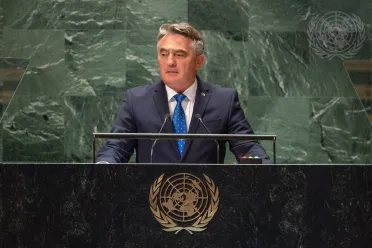Statement
Statement summary
ŽELJKO KOMŠIĆ, Chairman of the Presidency of Bosnia and Herzegovina, reiterated his country’s support for the 2030 Agenda. While its implementation would lead Member States and their societies to self-sustainable development, its achievement will be challenging in today’s world dominated by wars and geopolitical interests. One of the issues in building trust and encouraging global solidarity is migration, he pointed out. While migrants are often seen as beneficiaries of the Sustainable Development Goals, the picture is different regarding their countries of origin. He claimed that powerful countries select capable migrants and benefit from “exploiting their knowledge and abilities”, thereby weakening the smaller States. The latter are thus losing both human capital and investment made into training highly qualified individuals. “It is difficult to talk about building trust while larger countries and their large systems are taking over the population of smaller countries through migration,” he regretted.
This creates an environment in which poverty thrives and prevents socioeconomic development. The situation in Bosnia and Herzegovina corroborates this argument, he claimed, informing that there is a significant number of people leaving for more developed countries — mostly Western democracies. The main reason for their departure is the lack of perspective in their country. He stated that this is due to the political system in Bosnia and Herzegovina — one based on ethnicity. “In such a system, the key jobs are not performed by the best and most qualified people, but by the politically and ethnically suitable ones,” he detailed, adding that this creates space for nepotism and corruption in all segments of society, eroding trust and social cohesion. Further, the unfinished political system degrades democracy, slows the development of his country and hinders its accession to the European Union and the North Atlantic Treaty Organization (NATO), he noted.
He went on to accuse neighbouring countries of “skilfully using this political system to divide Bosnia and Herzegovina or make it meaningless as a State”. Twenty-seven years since being attacked by its two neighbours, such behaviour violates the minimum of interstate trust at the expense of building interstate cooperation, he underscored. In addition, this behaviour is often supported not only by authoritarian regimes but also by liberal democratic States, he wondered, stressing that: “We will certainly not allow the division and disappearance of our thousand-year-old State.” Calling for the United Nations to support his country and its institutions to preserve peace in the Western Balkans, he reiterated that the fundamental problem of Bosnia and Herzegovina lies in the inequality of its citizens in the ethnic system of governance, destined to be conflictual. In such a situation, one easily loses hope in having a positive perspective for the future, he observed.
He lamented that the latest interventions of international representatives in Bosnia and Herzegovina strengthened the undemocratic principle of governance and deepened the discrimination of citizens. Highlighting that a transition to full democracy is a prerequisite for equality, especially in a post-war society, he declared that Bosnia and Herzegovina will have to change the entire paradigm and shift to civic political representation. In this regard, he condemned a political leader of a neighbouring country for rejecting a judgement of the European Court of Human Rights on this matter. This undermines Bosnia and Herzegovina and “is reminiscent of the attitudes towards international law that [Russian Federation President] Vladimir Putin has built in the case of Ukraine”, he warned. Only when the political system changes and attacks from the neighbouring countries cease will Bosnia and Herzegovina be ready to be a completely legitimate actor in contributing to self-sustainable development through building trust and global solidarity, he concluded.
Zeljko Komsic, the Chairman of the Presidency of Bosnia and Herzegovina, addressed the UN General Assembly on Wednesday, railing against the impact of larger countries’ allegedly selective and exploitative immigration policies, a government defined by ethnic divisions, and the intentional undermining of his nation’s stability by its “western and eastern neighbours.”
Full statement
Read the full statement, in PDF format.
Photo

Previous sessions
Access the statements from previous sessions.
